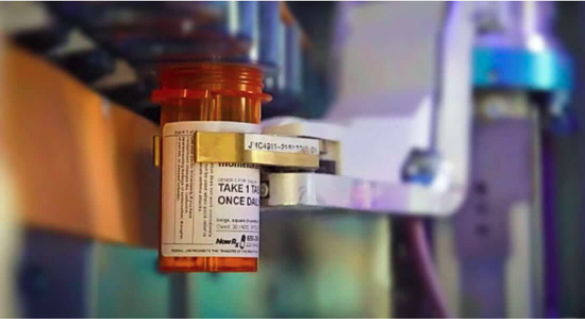| | | | | | | Presented By NowRx | | | | Axios Markets | | By Matt Phillips and Emily Peck ·Mar 31, 2022 | | 🌅 Good morning! We're creeping ever closer to the weekend, and honestly today our vibe is cyberloafing. But first, Matt peers under the hood for an end-of-the-month stocks lookback and has an update on corporate profits. Check it out. ✅ P.S. You can sign up for the Axios Crypto newsletter launching soon! Today's newsletter is 1,035 words, 4 minutes. | | | | | | 1 big thing: The stock market's fine with rising recession risk |  Data: FactSet, Goldman Sachs; Chart: Axios Visuals The S&P 500 is cruising toward a 5% gain in March, which would be its best month since October, Matt writes. Why it matters: The turn higher for the market — after it was down by more than 10% — underscores what attentive investors have come to understand over the last couple of years. The stock market isn't the economy. Flashback: Remember when the economy was in an all-out collapse in the aftermath of the pandemic? Food bank lines miles long? Unemployment that was quite literally off the charts? - After the initial shock, stocks rocketed higher.
- Between March 23, 2020, when stocks hit bottom, and Dec. 31, 2020, the S&P 500 jumped an astounding 68%.
Why? Government actions. The Federal Reserve cut interest rates to near zero and Congress spent gobs of money to keep the economy from imploding. (Stock markets like free money.) - Today, conditions are much different. Inflation is high. The Fed is raising rates, and little additional government stimulus is expected.
Yes, but: We're still seeing the same kind of stocks that led the market higher in 2020 — so-called long-duration stocks that benefit from lower interest rates — leading the market higher right now. - Goldman Sachs' basket of such stocks, an assemblage of health tech, software and IT companies, for the most part, is up nearly 7% this month, beating the performance of the S&P.
The intrigue: This may seem a little surprising as long-term interest rates — essentially the yield on the 10-year Treasury note — are still going up. In theory, that should hurt these stocks because they're supposed to be sensitive to rising rates. My thought bubble: One way to square the circle? The yield curve. - The market's romp began in mid-March. That's right around the time the Fed started hiking rates and signaling that it would keep doing so in order to pull inflation back — even if that hurt the economy.
- That was also when the yield curve really started to crumble. (Translation: The gap narrowed between shorter-term and longer-term rates.)
The bottom line: Essentially, stock market investors may be betting that the Fed's going to hike interest rates hard, which could cause a recession — and eventually return the economy to the sort of slow growth, low-inflation environment that served tech stock investors well for over a decade. |     | | | | | | 2. Catch up quick | | 🛢 Biden plans to release up to 1 million barrels of oil a day from the strategic reserve. (AP) 🔋And the president plans to boost domestic production of EV batteries. (Bloomberg) 🏦 FDIC issues climate risk guidelines for big banks. (Bloomberg) |     | | | | | | 3. 💰Corporations are quite profitable |  Data: FactSet; Chart: Axios Visuals Corporate profits hit another record in 2021, though the breakneck pace of growth slowed sharply during the fourth quarter, Matt writes. Why it matters: This shows that companies have been able to overcome the inflationary wave flowing through the U.S. economy — and even profit from it. State of play: Companies complained loudly about rising costs for raw materials and labor for most of 2021, but data released yesterday by the Commerce Department show that they passed those costs along — and then some. - For the full year 2021, pre-tax profits rose 25% to roughly $2.81 trillion, handily outpacing the 7% rise in consumer prices over the same stretch.
Yes, but: But the pace of growth slowed sharply in Q4, as profits inched up only 0.7% from Q3 (to an annualized pace of $2.94 trillion) — which could mean that the long-awaited pinch on profits from higher prices is starting. What to watch: Another earnings season kicks off in a few weeks. |     | | | | | | A message from NowRx | | A tech-powered investment even a bear would love | | |  | | | | No matter what the future holds, people always need their meds. That's what makes NowRx's tech-powered pharmacy a solid investment. Using software and robotics to operate at a fraction of the cost of major chains, NowRx delivers medications same day, for free. Learn more and invest in NowRx. | | | | | | 4. Mississippi's new equal pay loopholes |  Note: Rankings include Washington, D.C.; Data: National Women's Law Center; Chart: Jared Whalen/Axios The Mississippi state legislature passed an equal pay bill yesterday — but the bill could actually make it harder for women to get paid equally, Emily writes. Why it matters: Mississippi was the only state in the country without an equal pay law, or a law prohibiting employers from paying workers differently based on sex. - But the Mississippi Equal Pay for Equal Work Act, which is headed for the governor's desk, explicitly allows for exceptions.
- Employers can defend paying workers less by pointing to salary history, gaps in their work history, their negotiation tactics, or lack of — factors that often reinforce women's lower pay.
The big picture: Indeed, 16 states forbid employers from even asking for an applicant's salary history because research has shown that it reinforces pay inequity even when women switch employers. But proponents lauded the bill as a step forward. The state's attorney general, Lynn Fitch, told Axios in an emailed statement that she didn't agree with the critics. - It's a "giant leap forward in closing the twenty-seven percent pay gap — that makes it harder for working women and their families, that leads to young Mississippi women taking their talents beyond our borders, and that perpetuates the cycle of poverty in our State," Fitch said.
State of play: Women make up about half the workforce in Mississippi, said Cassandra Welchlin, president of the Mississippi Black Women's Roundtable. - About two-thirds of them are earning $7.25 an hour. That's the minimum wage.
- Women's annual wages in the state are the lowest in the country, at $33,140.
Keep reading. |     | | |  | | | | If you like this newsletter, your friends may, too! Refer your friends and get free Axios swag when they sign up. | | | | | | | | 5. More signs employers are loosening standards |  | | | Illustration: Aïda Amer/Axios | | | | Several states are working on legislation that would automate the tedious and complex process used to clear someone's criminal record, reports Axios' Margaret Harding McGill. Why it matters: The tight labor market is pushing states and employers to figure out new strategies for bringing more potential workers into the workforce. - "It's important to realize this is a workforce development issue," said Republican Rep. Nicole Miller, who sponsored such a bill in Oklahoma.
- "We're looking for people to fill so many roles, not only in Oklahoma, but across the nation. I don't think that there's any better time to be doing this."
What's happening: New York, Colorado and Oklahoma are the latest states to advance legislation that would automate the process for record sealing or expungement. Between the lines: Companies are trying to bring more workers into the so-called funnel of candidates, as Emily wrote Monday. - Businesses also appear to be loosening drug-screening processes, particularly around marijuana, the Wall Street Journal reported yesterday.
Go deeper: America gets a clean record |     | | | | | | A message from NowRx | | A tech-powered investment even a bear would love | | |  | | | | People will always need to get their meds, making NowRx's tech-powered pharmacy a solid investment. Even in a bear market. Now, with over $26 million in annualized revenue, NowRx is poised for national expansion in 2022. Join over 10,000 others and invest in NowRx today. | | |  | It's called Smart Brevity®. Over 200 orgs use it — in a tool called Axios HQ — to drive productivity with clearer workplace communications. | | | | | | Axios thanks our partners for supporting our newsletters. If you're interested in advertising, learn more here.
Sponsorship has no influence on editorial content. Axios, 3100 Clarendon Blvd, Suite 1300, Arlington VA 22201 | | | You received this email because you signed up for newsletters from Axios.
Change your preferences or unsubscribe here. | | | Was this email forwarded to you?
Sign up now to get Axios in your inbox. | | | | Follow Axios on social media:    | | | | | |












No comments:
Post a Comment